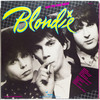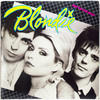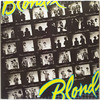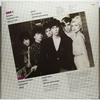Year: 1979 (LP 1979)
Label: Chrysalis Records (UK), CDL 1225E
Style: Pop, New Wave
Country: New York City, U.S.
Time: 42:32
Format: Flac Tracks 16/44,1 kHz
Size: 295 Mb
Blondie has always been a band less concerned with weaving dreams than with critiquing them in order to emphasize the distance between desire and fulfillment. They pioneered a reverse-twist musical archivism that’s antiromantic rather than escapist: instead of digging for intact nuggets of nostalgia, Blondie went at pop tradition with a ball peen hammer, splintering and rearranging shards of the past according to an up-to-date aesthetic. Familiar fragments conjured up classic fantasies — a series of teen dreams and B movies, all of them starring Deborah Harry — while the pared-down context underscored their irrelevance. Singing like either a petulant baby doll or a Thorazined waif, Harry modeled pop images, then ripped them to shreds.
With each LP, Blondie has updated their musical mosaic by assimilating another chunk of pop history. Plastic Letters added touches of neopsychedelic electronics to the mock-girl-group sound of the band’s debut. The repackaging and refinements of last year’s Parallel Lines helped reduce Blondie’s we-know-better-now perspective from the larger-than-life campiness of their early work to a subtler, eyebrow-raised irony: a level of detachment perfectly calculated to let the group play it both ways with a discofied song like "Heart of Glass."
Smart, smirky and elating as those albums were, they had the unsatisfying feel of schoolwork turned in by a brilliant dilettante whose greatest effort went toward maintaining a stance of noncommittal, deathless cool that guarded against expectations while holding back energy for a future, more worthy challenge.
Alone among the bands that emerged from the mid-Seventies New York punk-club circuit, Blondie has always regarded success as necessary, well deserved and inevitable. You got the feeling that if Deborah Harry and Chris Stein didn’t become famous as rock stars, they’d gain fame as something else.
With Eat to the Beat, all that smug certainty has been vindicated. Faced with the challenge of following up the million-selling Parallel Lines, Blondie has delivered a record that’s not only ambitious in its range of styles, but also unexpectedly and vibrantly compelling without sacrificing any of the group’s urbane, modish humor. As if to distinguish Blondie from the pop revival they helped catalyze, Eat to the Beat subjugates melody to momentum: in their construction and in Mike Chapman’s dense, crystalline production, most of the tracks are organized around Clem Burke’s superb drumming. The new LP is — purposefully, I think — less overtly hooky than Parallel Lines, exchanging that album’s cool self-possession for an engaging neuroticism. If hooks are the small revelations of rock & roll, then the beat is its obsession.
Blondie’s obsession here is with dreams and distance — the band’s usual themes, now suddenly personalized by its own success. Like a comedian who outlasts and outclasses the subjects of his impressions, the group itself has become a pop image as powerful as any it can invoke. Blondie has invariably recognized the resonances that stardom has from without: Jimmy Destri’s "Fan Mail" on Plastic Letters captures perfectly the lightheaded devotion of hero-worship. Now they’re comparing perspectives. Without ever approaching a music-biz cliche, Eat to the Beat explores the nagging paradoxes of success — like the way it imposes distance between you and your surroundings, your memories and your dreams. Or the contrast between internal and external transformation, means and ends, recognition and risk taking.
"Dreaming" makes the keynote statement. Burke’s drums roll in and out like the inexorable pounding of breakers on the beach, nearly drowning out Stein’s twangy, Beatles-style guitar riff and the keening, insistent reiteration of the six-note refrain. Harry’s voice emerges in smooth peals, as if she’s found a place for herself beyond the waves:
Reel to reel is living rarity
People stop and stare at me
We just walk on by
We just keep on dreaming.
Holding private thought so dear raises the ante on fantasies: the dreams played out on Eat to the Beat are all high-stakes dramas. The throbbing, witty "The Hardest Part" weds — not for the first time — sexual and financial fantasy ("No short heist/No overnight/Big money/Take it to Brazil"), while "Union City Blue" evokes life-or-death romance. Mixed with the intertwined-guitars-and-keyboards density of "Dreaming," "Union City Blue" has the force of an incantation. Key words — power, passion — slip out with a resonant urgency. Harry’s finally using her sweet tones to create real emotional intensity.
Eat to the Beat shows off Deborah Harry’s increasing pleasure in her craft — the histrionic screeching of "Victor" must have been fun — as well as her incredible improvement as a stylist. (The record’s only dud is "Sound-a-Sleep," an insomniac’s lullaby with artificial crooning a la Doris Day.) It’s exhilarating to hear her give thematic depth to the contrast between "Shayla" and the title tune; her wordless, whippoorwill vocals in the former do more to convey the apotheosis of an ex-working girl (it could be Harry’s own story) than do all of Stein’s banal, "cosmic energy" lyrics. If "Shayla" is about arriving, the careening, jumping "Eat to the Beat" makes the route explicit — you travel to the top, toes tapping, by way of a lot of rock & roll street corners. Alternately petulant and gleeful, Harry flings lyrics around like a prizefighter.
In "Accidents Never Happen" and "Die Young Stay Pretty" (the latter a carousel reggae number with mock-steel-drum punctuation), the band enumerates constraining real-world pressures and expectations. In search of blessed predictability ("...in a perfect world/Complications disappear"), Blondie finds only the time clocks of mortality and the media. With "Atomic," meanwhile, they deflect some of these expectations by going the steely irony of "Heart of Glass" one better. By uniting a Ventures guitar line, a pulsing Eurodisco synthesizer and cascading female harmonies with some deliberately facile lyrics ("Your hair is beautiful.../Atomic me tonight"), the group smoothly rewrites sexual cliches.
(Rolling Stone. Magazine. By Debra Rae Cohen. November 30, 1983 5:00AM ET)
01. A1 Dreaming (03:04)
02. A2 The Hardest Part (03:39)
03. A3 Union City Blue (03:19)
04. A4 Shayla (03:53)
05. A5 Eat To The Beat (02:39)
06. A6 Accidents Never Happen (04:10)
07. B1 Die Young Stay Pretty (03:31)
08. B2 Slow Motion (03:26)
09. B3 Atomic (04:37)
10. B4 Sound-A-Sleep (04:14)
11. B5 Victor (03:16)
12. B6 Living In The Real World (02:40)







No comments:
Post a Comment